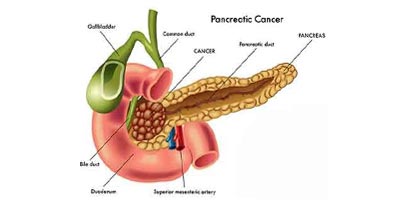
Pancreatic cancer begins in the tissues of your pancreas — an organ in your abdomen that lies horizontally behind the lower part of your stomach. Your pancreas secretes enzymes that aid digestion and hormones that help regulate the metabolism of sugars.
Pancreatic cancer often has a poor prognosis,because most often they are diagnosed at an advanced stage. If detected early, surgery can be curative in few cases depending on your final biopsy report.
Signs and symptoms of pancreatic cancer often don’t occur until the disease is advanced. When signs and symptoms do appear, they may include:
It’s not clear what causes pancreatic cancer.
Your pancreas is about 6 inches (about 15 centimeters) long and looks something like a pear lying on its side. The pancreas secretes hormones, including insulin, to help your body process sugar in the foods you eat. And it produces digestive juices to help your body digest food.
Pancreatic cancer occurs when cells in your pancreas develop mutations in their DNA. These mutations cause cells to grow uncontrollably and to continue living after normal cells would die. These accumulating cells can form a tumor.
Most pancreatic cancer begins in the cells that line the ducts of the pancreas. This type of cancer is called pancreatic adenocarcinoma or pancreatic exocrine cancer.
Rarely, cancer can form in the hormone-producing cells of the pancreas. This type of cancer is called islet cell cancer or pancreatic endocrine cancer.
Factors that may increase your risk of pancreatic cancer include:
As pancreatic cancer progresses, it can cause complications such as:
In severe cases, your doctor may recommend a procedure to inject alcohol into the nerves that control pain in your abdomen (celiac plexus block). This procedure stops the nerves from sending pain signals to your brain.
Pancreatic enzyme supplements may be recommended to aid in digestion. Try to maintain your weight by adding extra calories where you can and making mealtime as pleasant and relaxed as possible.
If your doctor suspects pancreatic cancer, you may have one or more of the following tests to diagnose the cancer:
Using information from staging tests, your doctor assigns your pancreatic cancer a stage. The stages of pancreatic cancer are:
Treatment for pancreatic cancer depends on the stage and location of the cancer as well as on your age, overall health and personal preferences.
The first goal of pancreatic cancer treatment is to eliminate the cancer, when possible. When that isn’t an option, the focus may be on preventing the pancreatic cancer from growing or causing more harm.
When pancreatic cancer is advanced and treatments aren’t likely to offer a benefit, your doctor will help to relieve symptoms and make you as comfortable as possible.
Surgery may be an option if your pancreatic cancer is confined to the pancreas. Operations used in people with pancreatic cancer include:
The Whipple procedure involves removing the head of your pancreas, as well as a portion of your small intestine (duodenum), your gallbladder and part of your bile duct. Part of your stomach may be removed as well. Your surgeon reconnects the remaining parts of your pancreas, stomach and intestines to allow you to digest food.
Whipple surgery carries a risk of infection and bleeding. After the surgery, some people experience nausea and vomiting that can occur if the stomach has difficulty emptying (delayed gastric emptying).
Expect a long recovery after a Whipple procedure. You’ll spend several days in the hospital and then recover for several weeks at home.
Research shows pancreatic cancer surgery tends to cause fewer complications when done by experienced surgeons. Don’t hesitate to ask about your surgeon’s experience with pancreatic cancer surgery. If you have any doubts, get a second opinion.
Radiation therapy uses high-energy beams, such as X-rays, to destroy cancer cells. You may receive radiation treatments before or after cancer surgery, often in combination with chemotherapy. Or, your doctor may recommend a combination of radiation and chemotherapy treatments when your cancer can’t be treated surgically.
Radiation therapy usually comes from a machine that moves around you, directing radiation to specific points on your body (external beam radiation). In specialized medical centers, radiation therapy may be delivered during surgery (intraoperative radiation).
Chemotherapy uses drugs to help kill cancer cells. Chemotherapy can be injected into a vein or taken orally. You may receive only one chemotherapy drug, or you may receive a combination of chemotherapy drugs.
Chemotherapy can also be combined with radiation therapy (chemoradiation). Chemoradiation is typically used to treat cancer that has spread beyond the pancreas, but only to nearby organs and not to distant regions of the body. This combination may also be used after surgery to reduce the risk that pancreatic cancer may recur.
In people with advanced pancreatic cancer, chemotherapy may be used alone or it may be combined with targeted drug therapy.
To book your appointment with a gastro surgeon, please reach out to us on +91 8160650099

